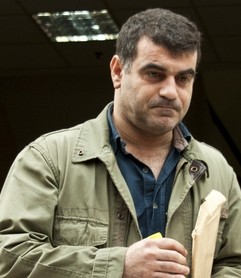8 Nov 2012 | Free Speech Bites
Broadcaster and writer Jonathan Dimbleby is also a former Chair of the Index on Censorship board of trustees. In the opening episode of Free Speech Bites, he explains to Nigel Warburton why free speech matters, and the philosophy of John Stuart Mill, whose On Liberty is one of the greatest arguments against censorship.
Download the transcript here | Download the mp3 here
5 Nov 2012 | Campaigns, Europe and Central Asia, News and features

Greek Journalist Kostas Vaxevani after his arrest for exposing alleged tax cheats – Athens – Stathis Kalligeris | Demotix
The European Union has a duty to speak out against increasing censorship, writes Rohan Jayasekera (more…)
31 Oct 2012 | Europe and Central Asia, News and features
The arrest of editor Kostas Vaxevanis for exposing alleged tax cheats is just the latest attack on free speech in Greece. Democracy itself is now in danger, say Asteris Masouras and Veroniki Krikoni (more…)
30 Oct 2012 | Africa, Sub-Saharan Africa
 Nigerian poet Wole Soyinka knows something about the dangers of speaking out. In 1967 the Nobel Prize winner was arrested and held in solitary confinement for two years after criticising the Nigerian government, a military coup had taken place in 1966 and the country had plunged into civil war.
Nigerian poet Wole Soyinka knows something about the dangers of speaking out. In 1967 the Nobel Prize winner was arrested and held in solitary confinement for two years after criticising the Nigerian government, a military coup had taken place in 1966 and the country had plunged into civil war.
Pambazuku News, the innovative pan-African newsletter, recently published a fascinating in-depth interview with Soyinka about his work, the rise of militants in the country, and free expression. Here are some interesting quotes:
On the rise of militant Jihadist group, Boko Haram in Nigeria:
The unrest which is taking place as a result of Boko Haram, in my view, has attained critical mass. When a movement reaches that state of total contempt even for universal norms, it is sending a message to the rest of the world, and to the rest of that nation, that this is a war to the end. The president of Nigeria is making a mistake in not telling the nation that it should place itself on a war footing. There’s too much pussyfooting, there’s too much false intellectualisation of what is going on, such as this is the result of corruption, this is the result of poverty, this is the result of marginalisation. Yes, of course, all these negativities have to do with what is happening right now. But when the people themselves come out and say we will not even talk to the president unless he converts to Islam, they are already stating their terms of conflict.
On religion:
Religion is also freedom of expression. People want to express themselves spiritually. And they also exercise the right to try and persuade others into their own system of belief. Those nations that say it’s a crime to preach your religion are making a terrible mistake. All they’re doing is driving underground other forms of spiritual intuitions and practices.
If religion was to be taken away from the world completely, including the one I grew up with, I’d be one of the happiest people in the world. My only fear is that maybe something more terrible would be invented to replace it, so we’d better just get along with what there is right now and keep it under control.
On being imprisoned for speaking out against Nigeria’s military leaders:
Writing in certain environments carries with it an occupational risk. When I was imprisoned, without trial, it was as a result of a position I took as a citizen. Of course I used my weapon, which was writing, to express my disapproval of the [Biafran] civil war into which we were about to enter. These were people who’d been abused, who’d undergone genocide, and who felt completely rejected by the rest of the community, and therefore decided to break away and form a nation of its own. Unfortunately, the nature of my imprisonment meant that I couldn’t practise my trade because I was in solitary confinement for 22 months out of the 27, and I was deprived of writing material. So I had to somehow break through the barriers, smuggle in toilet paper, cigarette paper, scribble a few poems, pass messages outside. I was able to undertake exercises to make sure that I emerged from prison intact mentally.
On claims that free expression is a Western construct rather than a universal right:
There are many cultures on the African continent where days are set aside, days of irreverence where you can say anything you want about an all-powerful monarch or chief. It’s a safety valve. It’s a recognition of freedom of expression, which perhaps has not been exercised, and bottled up grievances; this is the day when you express your grievances in society. So there is no society, really, which does not boast some form or measure of freedom of expression. Now, it’s true that freedom of expression carries with it an immense responsibility. Well that is why laws of libel exist — that when you carry things too far, you can be hauled up before the community, and judged to see whether you are right to call somebody a thief, or a hypocrite, and damage his reputation. But unless you establish that principle of freedom of expression, we might all just go around with a padlock on our lips.
Sara Yasin is an editorial assistant at Index on Censorship


